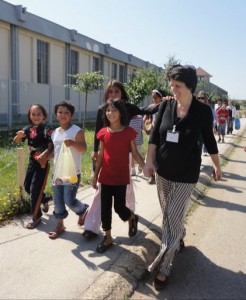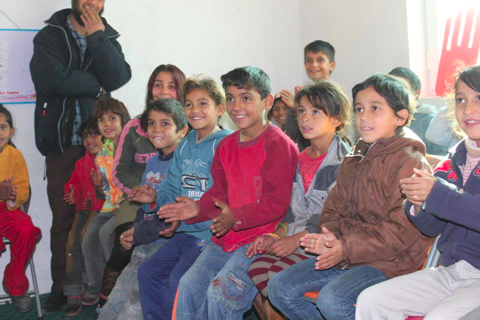30 Days Getting to School
Name: Elizabeth Gowing
Occupation: NGO founder and teacher
Website: theideaspartnership.org
How we met: I met Elizabeth in Kosovo earlier this year when I volunteered for The Ideas Partnership (TIP), an NGO she and her partner Rob founded with their friend Ardian Arifaj.
TIP implements grass roots education, environmental and community support projects for the Roma, Ashkali and Egyptian communities in Fushë Kosovë, 5km outside Kosovo’s capital Prishtina.
British by decent, Elizabeth is one of those people that you could listen to for hours. Wise and disarming, I certainly get a sense every time I speak with her that I’m a little smarter for it.
Meet Elizabeth, one of the world’s best global citizens:
On September 1, 2011, 62 kids set off for school from their ramshackle homes in a Roma community on the outskirts of Kosovo’s capital. The stream of children with bright new backpacks felt like an enormous achievement – for each of them, and for our small Kosovo charity who had worked to get them registered. I saw that day as the endpoint of months of exhausting work. But in fact, it was just the beginning.
The charity which my partner and I set up with a friend in Kosovo had spent the previous six months working to change a government policy which was keeping kids out of school if they didn’t register in time. Our work started when we met one nine-year-old girl who said she wanted to go to school but had been told by the head teacher that she had missed her chance – forever – because she hadn’t registered before the age of nine.
When we discovered another 20 children like her among her immediate neighbours, we saw that this was a systemic problem, and within two weeks we’d started running classes for the children every weekday morning and spent our afternoons running a lobbying campaign to change the government policy. Soon we had more than fifty children attending our classes every day. (You can read the story of how the project developed at the blog Get Gjelane To School)
My blogging ended shortly after we won agreement from the ministry, municipality and school that the children could be registered and start with their peers in the new school year. None of us wanted to be naïve – we knew there would be challenges ahead – but it felt like the biggest battle had now been won. At least we knew we had a great team on our side – by September we had more than 60 volunteers working in our organisation, which was 10 times more than we’d had the previous year.
Even more importantly, as well as the foreigners like myself (and Christie) passing through Kosovo, we had volunteers who were Kosovar Albanians or from the Roma, Ashkali and Egyptian communities who live together in the neighbourhood where we’d been working. We were a bit more secure financially too – from the initial fundraising evening which had raised enough money for six months rent of a flat above a mini-market, we had received more private donations and a few small grants from aid agencies.
On the day that I went into school and found Shefkije standing in the corridor, I knew we were going to need all these resources.
“What are you doing standing here?”
“The teacher’s sent me home.”
“What have you done?”
I’m ashamed to say that my immediate assumption was that this must be Shefkije’s fault.
“Nothing. She just told me ‘don’t come here any more’.”
Shefkie and I went to the head teacher. No, he didn’t know that she’d been sent home. No, Shefkije hadn’t misbehaved as far as he knew. We went to see the teacher. She gestured at her overcrowded class and confirmed that there was nothing in Shefkije’s behaviour that had prompted her to send her home. It was just that there were too many children there now.
We sent Shefkije to sit down (in the chair where she’d originally been placed by the teacher, at the back of the class, with the other Roma, Ashkali and Egyptian children).
In the first week of school, 11 of Shefkije’s neighbours were sent home like her. Some were told they were too small for the furniture, others were told they were too big. One was told to come back when an extension had been built to accommodate them. A brother and sister were told they had fleas (though we took them to a doctor to confirm that they did not).
In each case we – volunteers and our wonderful new employee, a Family Advocate from the community, who is a father of seven – took the children back to school and had a hard conversation with teachers and head teacher. We talked, too, to the children’s parents – many of whom had not been to school themselves, and who felt that if the teacher said their child was ‘too big’ or ‘too small’ the teacher must be right.
We started Saturday activities for Shefkije and all the children we’d registered, to give them a regular chance to talk to us, a bit of help with reading, writing, maths and English, and a sense of solidarity in the often hostile education system where they now found themselves. We got better at liaising with other agencies working with families in this neighbourhood.
When the school introduced compulsory uniforms at a few weeks’ notice (uniforms cost 6 euro each. If, like Shefkije’s father, you have four children at school that’s 24 euro. Social security is 75 euro per month) we used some of the donations we’d been given to buy each child the required badged overalls.
When the school refused to register a boy because he didn’t have a birth certificate, we worked with the family and social services to get him his certificate. He finally started school in January and when his teacher then complained that she wasn’t willing to teach him because he didn’t know his alphabet and had missed the teaching that others in class had had, we put in place daily academic support out of school time.
We didn’t have success with all the children. The brother and sister who had been accused of having fleas refused to go back to school and it was hard to persuade them. Would you return to a situation like that where you had started on the back foot anyway and then been further humiliated in front of your classmates? In some cases, parents found that their children’s attendance at school was denting the family income because the kids weren’t out working in the rubbish bins, and the children were sent back to work.
Of our 62 children, 23 dropped out apparently irreversibly. Exactly 23 others attended regularly all year. Four girls wear headscarves which by law they are required to remove for school, and they have refused to do so and are therefore out of school. The 12 other children of our 62 are currently attending summer catch-up classes because their attendance during the year wasn’t good enough. If they complete these classes they’ll be able to return to join their peers in school.
We’ve now registered a further 27 children who will start new at school on Monday, September 3. We’ll be following them and their teachers closely – particularly in that crucial first week at school, hoping that not just Shefkije but the whole education system in Kosovo will have learned something since this time last year.
You can follow the children’s journey through the Kosovar education system by following TIP on Facebook at Theideaspartner Ship. Interested in helping? Find out more at theideaspartnership.org
You can also read about Elizabeth’s adventures in Kosovo in her book, Travels in Blood and Honey: Becoming a beekeeper in Kosovo.


 30 Days -
30 Days - Missed Christie on Sunrise? See it here!
Missed Christie on Sunrise? See it here!


Comments
Trackbacks
Check out what others are saying about this post.[…] 30 Days Getting to School […]